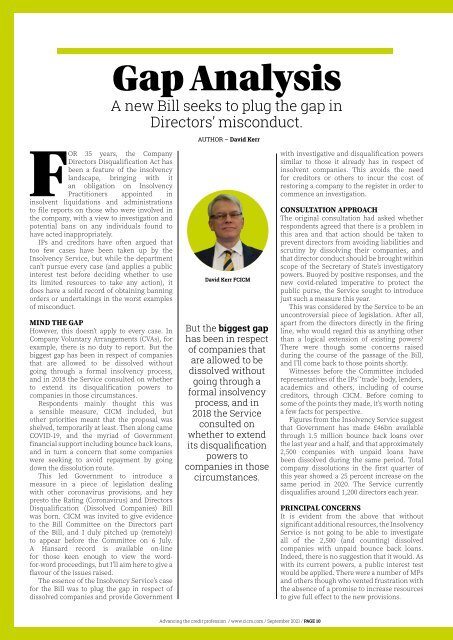CM September 2021
You also want an ePaper? Increase the reach of your titles
YUMPU automatically turns print PDFs into web optimized ePapers that Google loves.
Gap Analysis<br />
A new Bill seeks to plug the gap in<br />
Directors’ misconduct.<br />
AUTHOR – David Kerr<br />
FOR 35 years, the Company<br />
Directors Disqualification Act has<br />
been a feature of the insolvency<br />
landscape, bringing with it<br />
an obligation on Insolvency<br />
Practitioners appointed in<br />
insolvent liquidations and administrations<br />
to file reports on those who were involved in<br />
the company, with a view to investigation and<br />
potential bans on any individuals found to<br />
have acted inappropriately.<br />
IPs and creditors have often argued that<br />
too few cases have been taken up by the<br />
Insolvency Service, but while the department<br />
can’t pursue every case (and applies a public<br />
interest test before deciding whether to use<br />
its limited resources to take any action), it<br />
does have a solid record of obtaining banning<br />
orders or undertakings in the worst examples<br />
of misconduct.<br />
MIND THE GAP<br />
However, this doesn’t apply to every case. In<br />
Company Voluntary Arrangements (CVAs), for<br />
example, there is no duty to report. But the<br />
biggest gap has been in respect of companies<br />
that are allowed to be dissolved without<br />
going through a formal insolvency process,<br />
and in 2018 the Service consulted on whether<br />
to extend its disqualification powers to<br />
companies in those circumstances.<br />
Respondents mainly thought this was<br />
a sensible measure, CI<strong>CM</strong> included, but<br />
other priorities meant that the proposal was<br />
shelved, temporarily at least. Then along came<br />
COVID-19, and the myriad of Government<br />
financial support including bounce back loans,<br />
and in turn a concern that some companies<br />
were seeking to avoid repayment by going<br />
down the dissolution route.<br />
This led Government to introduce a<br />
measure in a piece of legislation dealing<br />
with other coronavirus provisions, and hey<br />
presto the Rating (Coronavirus) and Directors<br />
Disqualification (Dissolved Companies) Bill<br />
was born. CI<strong>CM</strong> was invited to give evidence<br />
to the Bill Committee on the Directors part<br />
of the Bill, and I duly pitched up (remotely)<br />
to appear before the Committee on 6 July.<br />
A Hansard record is available on-line<br />
for those keen enough to view the wordfor-word<br />
proceedings, but I’ll aim here to give a<br />
flavour of the issues raised.<br />
The essence of the Insolvency Service’s case<br />
for the Bill was to plug the gap in respect of<br />
dissolved companies and provide Government<br />
David Kerr FCI<strong>CM</strong><br />
But the biggest gap<br />
has been in respect<br />
of companies that<br />
are allowed to be<br />
dissolved without<br />
going through a<br />
formal insolvency<br />
process, and in<br />
2018 the Service<br />
consulted on<br />
whether to extend<br />
its disqualification<br />
powers to<br />
companies in those<br />
circumstances.<br />
with investigative and disqualification powers<br />
similar to those it already has in respect of<br />
insolvent companies. This avoids the need<br />
for creditors or others to incur the cost of<br />
restoring a company to the register in order to<br />
commence an investigation.<br />
CONSULTATION APPROACH<br />
The original consultation had asked whether<br />
respondents agreed that there is a problem in<br />
this area and that action should be taken to<br />
prevent directors from avoiding liabilities and<br />
scrutiny by dissolving their companies, and<br />
that director conduct should be brought within<br />
scope of the Secretary of State’s investigatory<br />
powers. Buoyed by positive responses, and the<br />
new covid-related imperative to protect the<br />
public purse, the Service sought to introduce<br />
just such a measure this year.<br />
This was considered by the Service to be an<br />
uncontroversial piece of legislation. After all,<br />
apart from the directors directly in the firing<br />
line, who would regard this as anything other<br />
than a logical extension of existing powers?<br />
There were though some concerns raised<br />
during the course of the passage of the Bill,<br />
and I’ll come back to those points shortly.<br />
Witnesses before the Committee included<br />
representatives of the IPs’ ‘trade’ body, lenders,<br />
academics and others, including of course<br />
creditors, through CI<strong>CM</strong>. Before coming to<br />
some of the points they made, it’s worth noting<br />
a few facts for perspective.<br />
Figures from the Insolvency Service suggest<br />
that Government has made £46bn available<br />
through 1.5 million bounce back loans over<br />
the last year and a half, and that approximately<br />
2,500 companies with unpaid loans have<br />
been dissolved during the same period. Total<br />
company dissolutions in the first quarter of<br />
this year showed a 25 percent increase on the<br />
same period in 2020. The Service currently<br />
disqualifies around 1,200 directors each year.<br />
PRINCIPAL CONCERNS<br />
It is evident from the above that without<br />
significant additional resources, the Insolvency<br />
Service is not going to be able to investigate<br />
all of the 2,500 (and counting) dissolved<br />
companies with unpaid bounce back loans.<br />
Indeed, there is no suggestion that it would. As<br />
with its current powers, a public interest test<br />
would be applied. There were a number of MPs<br />
and others though who vented frustration with<br />
the absence of a promise to increase resources<br />
to give full effect to the new provisions.<br />
Advancing the credit profession / www.cicm.com / <strong>September</strong> <strong>2021</strong> / PAGE 10


















